 The newest issue of College Literature (General Issue 37.4 / Fall 2010) includes the essay “Assessing the Promise of Jonathan Franzan’s First Three Novels: A Rejection of ‘Refuge'” by Ty Hawkins (Ph. D., Saint Louis University). Frazen’s works cited in the essay: The Twenty-Seventh City, Strong Motion, The Corrections, “Mr. Difficult” and “A Word About This Book,” both from How to Be Alone: Essays.
The newest issue of College Literature (General Issue 37.4 / Fall 2010) includes the essay “Assessing the Promise of Jonathan Franzan’s First Three Novels: A Rejection of ‘Refuge'” by Ty Hawkins (Ph. D., Saint Louis University). Frazen’s works cited in the essay: The Twenty-Seventh City, Strong Motion, The Corrections, “Mr. Difficult” and “A Word About This Book,” both from How to Be Alone: Essays.
NewPages Blog
At the NewPages Blog readers and writers can catch up with their favorite literary and alternative magazines, independent and university presses, creative writing programs, and writing and literary events. Find new books, new issue announcements, contest winners, and so much more!
Adam Gussow and Blues English
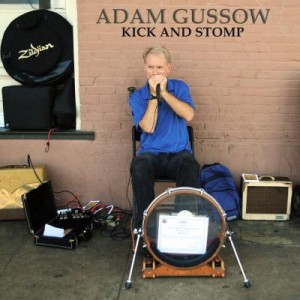 Adam Gussow: Ole Miss English prof by day, blues man by – well – day also: “I’ve always had a dual interests between the blues and literature,” Gussow said. “I treat blues lyrics like lyric poetry. I try to keep a balance situated between performance and critique.” Gussow’s solo album, Kick and Stomp, has just been released.
Adam Gussow: Ole Miss English prof by day, blues man by – well – day also: “I’ve always had a dual interests between the blues and literature,” Gussow said. “I treat blues lyrics like lyric poetry. I try to keep a balance situated between performance and critique.” Gussow’s solo album, Kick and Stomp, has just been released.
Spread the word!
The Healing Muse – Content of Common Experience
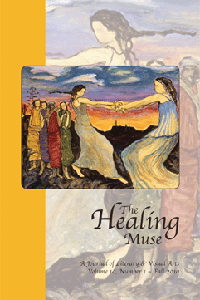 In the Editor’s Note for the Fall 2010 issue of The Healing Muse, Deirdre Neilen writes, “Our lives have their own unique roads to travel, but when the detour called Illness enters, we soon learn we have joined, willingly or unwillingly, a very large community with a language and a culture of its own that demands our attention and commitment…we become adept negotiators of hospital mores and insurance protocols, of treatment modalities and drug therapies; the mildest among us morph into warrior-advocates for our loved ones; we stand shoulder to shoulder with our nurses and physicians, our therapists, and our own research. And we write about the bartering, the begging, the rage; we’re not too proud to pray, to swear, to do whatever it takes to get a cure, an extension, a hope. We suffer – either as the person who is ill or as one who witnesses and cares for that one.
In the Editor’s Note for the Fall 2010 issue of The Healing Muse, Deirdre Neilen writes, “Our lives have their own unique roads to travel, but when the detour called Illness enters, we soon learn we have joined, willingly or unwillingly, a very large community with a language and a culture of its own that demands our attention and commitment…we become adept negotiators of hospital mores and insurance protocols, of treatment modalities and drug therapies; the mildest among us morph into warrior-advocates for our loved ones; we stand shoulder to shoulder with our nurses and physicians, our therapists, and our own research. And we write about the bartering, the begging, the rage; we’re not too proud to pray, to swear, to do whatever it takes to get a cure, an extension, a hope. We suffer – either as the person who is ill or as one who witnesses and cares for that one.
“Yet all this suffering somehow does not destroy us; we endure, and we incorporate it into the life we are trying to save, to maintain, to extend…”
And so begins this issue of The Healing Muse in recognition of its content, and the content of each and every issue. Hard core. Truthful. Honest. And recognizable, ‘relatable’ to so many of us.
Spread the word!
New Letters – Fat America Thin Literary Art
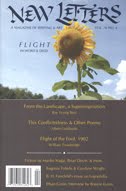 In “Grounded: An Editor’s Note” (full text online) in the newest edition of New Letters (v76, n4), Robert Stewart says, “As America gets fatter, it seems to want its art to become weightless.”
In “Grounded: An Editor’s Note” (full text online) in the newest edition of New Letters (v76, n4), Robert Stewart says, “As America gets fatter, it seems to want its art to become weightless.”
Ouch. But true. Read on.
“Kindle-like products seem fine enough, but marketing has induced many people I know into feeling guilty for continuing to prefer regular books and journals. I believe that physical matter in literary art, as in the universe, cannot be destroyed. One must know how, and sometimes where, to look. My institution’s library just celebrated the installation of a book ‘robot’ — sealed up, like Poe’s Fortunato, in a cave-like room—where the library will seclude a promised 80 percent of its books and print journals, accessible for request but not for browsing. We can browse cataloguing-in data; but books and journals on shelves, in aisles, belong to the physical world, due for a change. The library has its reasons, as a friend points out, trying to fulfill contradictory missions: to provide access and also preserve the materials. Articles and chapters on library reserve for student reading now must be digitized; so none of my own students need get up and actually enter the library. This weightlessness, I admit, weighs on me…”
And there’s more. Read the rest here.
Spread the word!
NewPages Literary Magazine Reviews Posted
Check out the latest great post of NewPages Literary Magazine Reviews, including both new and established publications in print:
Annalemma
Chinese Literature Today
Crazyhorse
Fourteen Hills
The Meadow
Minnetonka Review
Natural Bridge
Paterson Literary Review
Salt Hill
Santa Clara Review
Santa Fe Literary Review
The Seattle Review
Yellow Medicine Review
If you are interested in writing literary magazine reviews for NewPages, visit the Reviewer Guidelines.
Spread the word!
The AGNI Portfolio of African Fiction
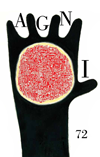 Coedited by E. C. Osondu and William Pierce, the AGNI Portfolio of African Fiction is a landmark gathering of stories from Djibouti, Nigeria, Uganda, South Africa, the Gambia, and elsewhere. “The AGNI Portfolio of African Fiction creates an unexpected portrait of the African continent—political, sexual, religious, commercial, and literary — by writers such as Abdourahman A. Waberi, Henrietta Rose-Innes, Helon Habila, Doreen Baingana, Chuma Nwokolo, Jr., and Monica Arac de Nyeko.” The portfolio will connect AGNI’s two venues this fall: half of the stories appearing in AGNI 72 (now available for purchase), and half available full text at AGNI Online.
Coedited by E. C. Osondu and William Pierce, the AGNI Portfolio of African Fiction is a landmark gathering of stories from Djibouti, Nigeria, Uganda, South Africa, the Gambia, and elsewhere. “The AGNI Portfolio of African Fiction creates an unexpected portrait of the African continent—political, sexual, religious, commercial, and literary — by writers such as Abdourahman A. Waberi, Henrietta Rose-Innes, Helon Habila, Doreen Baingana, Chuma Nwokolo, Jr., and Monica Arac de Nyeko.” The portfolio will connect AGNI’s two venues this fall: half of the stories appearing in AGNI 72 (now available for purchase), and half available full text at AGNI Online.
Spread the word!
Gulf Coast Prize Winners :: 2010
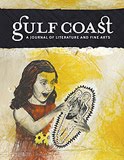 The newest issue of Gulf Coast (v23 i1) includes the 2010 winners of the Gulf Coast Prize:
The newest issue of Gulf Coast (v23 i1) includes the 2010 winners of the Gulf Coast Prize:
Judith Kroll, Nonfiction Winner, “Happy Families”
Sara Batkie, Fiction Winner, “Cleavage”
Anne Marie Rooney, Poetry Winner, “Flower sonnet”
Spread the word!
Poets on Family Incarnations
Guernica November 2010 includes “Deepening into Humanness” – guest Editor Emily Fragos introduces six poets who write about family incarnations — Matthew Zapruder, Cynthia Cruz, Gabriel Fried, Mark Wunderlich, Lynn Melnick, and Jennifer Franklin.
“The poets I have chosen as Guernica’s November guest poetry editor use ‘family’ in a variety of ways. But they all make the personal universal and the intimate a revelation, and they do this without self-pity or sentimentality. I was drawn by the deepening into humanness in each poem—lucid yet somehow mysterious—yet these poets did not try to be mysterious, which would have come across as pretentious and dishonest.”
Spread the word!
Creative Nonfiction Mentoring Program Classes
As part of their Mentoring Program, Creative Nonfiction will be offering two 10-week course taught by Anjali Sachdeva:
Basics in a Nutshell will introduce writers to the basics of creative nonfiction, exploring both the techniques used to gather information and the literary skills needed to turn bare facts into personal and compelling essays.
Writing the Personal Essay takes a close look at the writing and research skills needed to write a memoir or personal essay and refines them over the course of 10 weeks.
A complete outline of course content is available online. Registration is limited to 12 students each.
Spread the word!
Narrative Spring 2010 Story Contest Winners
The Narrative Spring 2010 Story Contest Winners‘ stories are now available to read online. Winners and finalists:
FIRST PLACE ($3,250)
Scott Tucker, “I Would Be Happy to Leave This Asylum”
SECOND PLACE ($1,500)
Peter Grimes, “Victoria”
THIRD PLACE ($750)
Megan Mayhew Bergman, “Birds of a Lesser Paradise”
TEN FINALISTS ($100 each)
Elizabeth Benedict
Mary Costello
Marta Evans
Katherine Jaeger
Elias Lindert
Alexander Maksik
Jerry Mathes II
E. V. Slate
Lynn Stegner
Lori Tobias
Spread the word!
The Obscure Reference: Sony Walkman in Literature
Who knew Sony’s Walkman would one day become an obscure reference in literature…
Spread the word!
Digital Poetry Exhibition
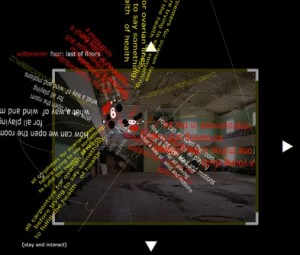 Jason Nelson has built an exhibition of digital poetry interfaces on heliozoa. Nelson writes, “In the simplest terms Digital Poems are born from the combination of technology and poetry, with writers using all multi-media elements as critical texts. Sounds, images, movement, video, interface/interactivity and words are combined to create new poetic forms and experiences. And when a piece like ‘game, game…’ attracts millions of readers while a ‘successful’ print poem might attract a hundred, I think the digital truly is the future of poetry.”
Jason Nelson has built an exhibition of digital poetry interfaces on heliozoa. Nelson writes, “In the simplest terms Digital Poems are born from the combination of technology and poetry, with writers using all multi-media elements as critical texts. Sounds, images, movement, video, interface/interactivity and words are combined to create new poetic forms and experiences. And when a piece like ‘game, game…’ attracts millions of readers while a ‘successful’ print poem might attract a hundred, I think the digital truly is the future of poetry.”
Spread the word!
Poetry :: Brianna Joelene Gionet
The beginning of Reincarnation by Brianna Jolene Gionet”
When my grandfather dies-
and comes back as a lion
I already know what he will smell like:
[Published in The Pacific Review]
Spread the word!
Handbook for Writers in Prison
 PEN’s Handbook for Writers in Prison features detailed guides on the art of writing fiction, nonfiction, poetry, and screenplays as well as information on punctuation, cover letters, and a list of recommended magazines and journals that consider work for publication. This is an invaluable resource to any incarcerated writer. To date, PEN has distributed 20,000 copies of the Handbook and continues to receive requests.
PEN’s Handbook for Writers in Prison features detailed guides on the art of writing fiction, nonfiction, poetry, and screenplays as well as information on punctuation, cover letters, and a list of recommended magazines and journals that consider work for publication. This is an invaluable resource to any incarcerated writer. To date, PEN has distributed 20,000 copies of the Handbook and continues to receive requests.
If you or someone you know is currently incarcerated, you are eligible to order a FREE copy of the Handbook for Writers in Prison. Workshop instructors who would like to use the Handbook for Writers in Prison for classes are encouraged to purchase copies for only $5.
Spread the word!
Tupelo Press / Crazyhorse Award Winner
 Winner of the Tupelo Press / Crazyhorse Award The Forest of Sure Things by Megan Snyder-Camp is now available for purchase.
Winner of the Tupelo Press / Crazyhorse Award The Forest of Sure Things by Megan Snyder-Camp is now available for purchase.
The 12th Annual Tupelo Press Award for a First or Second Book of Poetry is an open competition with a $3,000 prize. Submissions are accepted from anyone writing in the English language, whether living in the United States or abroad (translations are not eligible for this prize). Final judges will be the editors of Tupelo Press and the journal Crazyhorse. All entries must be postmarked or uploaded to the online Submission Manager between January 1 and April 15, 2011.
Spread the word!
New Lit on the Block :: Tygerburning Literary Journal
 Tygerburning Literary Journal is a print journal of poetry and poetics produced annually each spring by the MFA Program in Poetry at New England College in Henniker, NH. The journal seeks work that ranges from innovative to traditional lineages by emerging and established poets. Special features of each issue include a DVD presentation of cinepoetry, interdisciplinary works of new media, and spoken poetry performance.
Tygerburning Literary Journal is a print journal of poetry and poetics produced annually each spring by the MFA Program in Poetry at New England College in Henniker, NH. The journal seeks work that ranges from innovative to traditional lineages by emerging and established poets. Special features of each issue include a DVD presentation of cinepoetry, interdisciplinary works of new media, and spoken poetry performance.
There are a limited number of Issue #1 Journals with the DVD of Francesco Levato’s complete award winning cinepoetry selection, War Rug. Copies can be ordered through Marick Press.
Contributors for Issue #1: Kazim Ali, Nin Andrews, Lana Hechtman Ayers, Janet Barry, Tara Betts, Bhisham Bherwani, Sylva Boyadjian-Haddad, Martha Carlson-Bradley, Lee Ann Brown, Laynie Browne, Wendy Burk, Amanda Cobb, Joanna Penn Cooper, Melinda Curley, Stephan Delbos, Chard deNiord, Tenzin Dickyi, Karen Dietrich, Jonas Ellerstrom, Kathleen Fagley, Howard Faerstein, Patricia Fargnoli, Roberta Feins, Adam Fieled, Alice B. Fogel, Laura Davies Foley, Mary Gilliland, Mariela Griffor, James Harms, M.C. Jones, Ilya Kaminsky, Talia Katowicz, Anchia Kinard, Francesco Levato, Sara Lefsyk, Louise Landes Levi, Lesle Lewis, Barbara Lovenheim, Terry Lucas, Erica Lutzner, Mayra MacNeil, Tamara J, Madison, Eric Magrane, Kent Maynard, Tim Mayo, Mary McKeel, Stephen Paul Miler, Malena Morling, Nikoletta Nousiopoulis, Annemarie O’Connell, Ivy Page, Barbara Paparazzo, Alexandria Peary, Jane Lunin Perel, Douglas Piccinnini. Verandah Porche, Kyle Potvin, George Quasha, Steven Riel, Edith Sodergran, Leah Souffrant, Cinnamon Stuckey, K.A. Thayer, Matthew Ulland, Miguel Alejandro Valerio, Mark Watman, and Dorinda Wegener.
Submissions are being accepted for Issue #2 (Spring 2011), edited by James Harms, until December 15, 2010.
Spread the word!
Glimmer Train Short Story Award for New Writers Winners :: November 2010
Glimmer Train has just chosen the winning stories for their Short Story Award for New Writers. This competition is held quarterly and is open to all writers whose fiction has not appeared in a print publication with a circulation greater than 5000. The next Short Story Award competition will take place in November. Glimmer Train’s monthly submission calendar may be viewed here.
First p lace: Kathryne Young [pictured], of Woodside, CA, wins $1200 for “Roadrunner.” Her story will be published in the Winter 2012 issue of Glimmer Train Stories, out in November 2011.
lace: Kathryne Young [pictured], of Woodside, CA, wins $1200 for “Roadrunner.” Her story will be published in the Winter 2012 issue of Glimmer Train Stories, out in November 2011.
Second place: Jennifer Tomscha, of Ann Arbor, MI, wins $500 for “Sure Gravity.” Her story will also be published in an upcoming issue of Glimmer Train Stories, increasing her prize to $700.
Third place: Kate Rutledge Jaffe of Missoula, MT, wins $300 for “Talk About the Weather.”
A PDF of the Top 25 winners can be found here.
Deadline soon approaching for Family Matters: October 31
This competition is held twice a year and is open to all writers for stories about family. Word count should not exceed 12,000. (All shorter lengths welcome.) Click here for complete guidelines.
Spread the word!
Powell’s Books Offers Anne Rice Library Collection
Powell’s Books of Portland, OR acquired and is offering for sale a collection of books from the personal library of legendary author Anne Rice. “Included in the collection are editions signed or annotated by Ms. Rice, and many have her library markings on the spines. The collection showcases her love of literature and writing and reveals a true intellectual curiosity — classic philosophy, the Brontes, biblical archaeology, and Louisiana history are just a few of the subject areas represented.”
Spread the word!
Chetnia Bilingual Issue on Chekhov
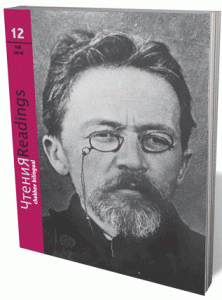 How can one understand what Chekhov is to Russian culture and Russian life? “Only by reading him,” says Tamara Eidelman in the latest issue of Chtenia: Readings from Russia. The Fall 2010 issue is a bilingual focus on Chekhov, including a translation of writing from Ivan Bunin, Russia’s first Nobel Laureate for literature (1933), and several of Chekhov’s stories both in Russian and in English translation: A Horsey Name, A Foolish Frenchman, The Student, The Seagull (excerpt), The Man in a Case, Gooseberries, and About Love. The volume is completed with an essay by Sasha Chyorny, “Why Did Chekhov Quit This Earth So Soon?”
How can one understand what Chekhov is to Russian culture and Russian life? “Only by reading him,” says Tamara Eidelman in the latest issue of Chtenia: Readings from Russia. The Fall 2010 issue is a bilingual focus on Chekhov, including a translation of writing from Ivan Bunin, Russia’s first Nobel Laureate for literature (1933), and several of Chekhov’s stories both in Russian and in English translation: A Horsey Name, A Foolish Frenchman, The Student, The Seagull (excerpt), The Man in a Case, Gooseberries, and About Love. The volume is completed with an essay by Sasha Chyorny, “Why Did Chekhov Quit This Earth So Soon?”
Spread the word!
Dunstan Thompson
The contemporary American literary scene is as vibrant and diverse as any other art community; thousands of writers and millions of readers participate and interact on a daily basis. But looking back to any past period of the community – say the 1940s and 50s, somewhere in the layover between modernism and postmodernism – the world of letters looks sparse. One can’t help but imagine that literary circles must surely have been as wide and broad as they currently are. But it feels as if so few writers have lasted even such a meager sum of time. We’re often led to believe that there’s a reason past artists fall into obscurity. D. A. Powell and Kevin Prufer prove that notion wrong. Continue reading “Dunstan Thompson”
Spread the word!
Room
I was website hopping the other day, and came to the Brooklyn bookstore BookCourt's list of Top 10 fiction bestsellers. On their hardcover list, at #3, was Room by Emma Donoghue, which they call "a perfect example of that book (maybe Wolf Hall is also in this category) that's been a total success without being read by a single person under the age of 30." I am here to attest that I am a person under 30 (though not for long) who has read the book. Not only read it, couldn't put it down. While I was on vacation in Miami. It is that good. Continue reading “Room”
Spread the word!
The Physics of Imaginary Objects
Occasionally you stumble across a piece of literary fiction so eloquent in its style, honest in its material, and direct in its approach that it resonates with you days, weeks, years after you read it. Such literature is valuable for both its simple sensory pleasure and its faith-restoring powers. Tina May Hall’s The Physics of Imaginary Objects is one of these intelligent, enlightening, and brazen books that you’ll want to place on your shelf at eye-level so you will remember to keep picking it up. Hall’s poetic style and articulate precision give this book a revolutionary quality. It nudges you along with an air of solemn importance and modest wisdom. Expertly composed and awesomely beautiful, Hall’s hybrid of poetry and prose is neither sparse nor excessive, sentimental nor detached, diffident nor ostentatious. It is, however, seamless – so delicately woven you forget it ever required stitching in the first place. The words fit together so effortlessly it sometimes feels like they just naturally occurred that way. Continue reading “The Physics of Imaginary Objects”
Spread the word!
Mentor
Mentor: A Memoir by Tom Grimes details the relationship of the author and his friend, teacher, and surrogate father, Frank Conroy. It opens with their initial meeting: Tom, a budding writer considering MFA options, is snubbed by Frank after a reading. "I spotted Stop-Time [Conroy's own critically-acclaimed memoir] on a high shelf and reached for it … I struggled to tear it in half. When I failed, I ripped out pages by the handful until I'd gutted the thing, splitting in two the author's name and the book's title … I turned and said, 'Fuck Frank Conroy.'" Continue reading “Mentor”
Spread the word!
Striking Surface
Striking Surface by Jason Schneiderman focuses on death, religion, and the violence and exile of war. Though writing on such serious topics, Schneiderman still manages to weave in pop culture references, referencing several leading ladies such as Grace Kelly in his poem “Billboard Reading,” Sandra Dee and Lana Turner in “Susan Kohner (Douglas Sirk’s Imitation of Life),” and Audrey Hepburn in “Elegy VII (Last Moment).” Continue reading “Striking Surface”
Spread the word!
Metrophilias
A geographical whirlwind, Connell’s debut collection presents 36 cities in alphabetical order (some letters get more than one hit … why eschew Moscow for Madrid? Xi’an, on the other hand, has no X peer). Each destination offers a story, a scene, or a vignette – as I read I came to think of them as little windows – into the city. A moment, a place, a person. Each encounter is an intense mixture of location and love. Continue reading “Metrophilias”
Spread the word!
Answer to an Inquiry
Swiss writer Robert Walser opens Answer to an Inquiry, originally published in 1907, by stating his purpose for writing it: “You ask me if I have an idea for you, sir, you ask me to draft a sketch, a play, a dance, a pantomime, or some other thing you could use, that you could depend on.” From there, Walser lists the materials needed for costumes, set, and lighting, and gives step-by-step instructions with commentary on how to convey true suffering to an audience: Continue reading “Answer to an Inquiry”
Spread the word!
Drain
Davis Schneiderman vividly creates a desolate and backward futuristic word in his novel Drain – a world that is made all the more terrifying for its uncanny resemblance to our own. Part sci-fi/fantasy (though certainly not the kind you want your kids to read), part psychological thriller, and part commentary on contemporary religion and politics, Drain follows numerous paths and occasionally fights the urge to draw extraneous ideas into its already-teeming domain. Continue reading “Drain”
Spread the word!
The Quickening
In a brief, illuminating YouTube interview on the publisher’s website, Michelle Hoover discusses the genesis of The Quickening. She discovered a typewritten memoir, composed in 1950, by her great grandmother about her experiences as a farmer and farm wife. The memoir of twenty or more pages covers much of this strong woman’s life in the first half of the Twentieth Century. Hoover used this story and further research on family history and U.S. farm life as a springboard to create the imaginative world of this novel. Continue reading “The Quickening”
Spread the word!
The Space Between Trees
Katie Williams’s debut YA novel, The Space Between Trees, is a lyrical journey into the lonely world of 16-year-old Evie, a friendless teen whose life changes forever after a childhood friend, Elizabeth “Zabet” McCabe, is murdered. Evie was friends with Zabet in middle school, but they hadn’t been close for ages. Adept at small, usually innocuous stretches of the truth, Evie finds herself telling Mr. McCabe at Zabet’s funeral that she was his daughter’s best friend. Evie’s lie initially repels Hadley Smith, a troubled, unstable teen who was Zabet’s real best friend, but Hadley soon draws Evie into her dangerous obsession to find Zabet’s killer. Continue reading “The Space Between Trees”
Spread the word!
Time of Sky & Castles in the Air
Sawako Nakayasu’s translation of Ayane Kawata’s Time of Sky & Castles in the Air proves that translating Japanese to English can result in a beautiful rebirth. The first half of the book, Time of Sky, is full of number-titled poems usually no longer than three or four lines in length, but these poems pack so much imagery and beautiful sounds that the reader often has no choice but to reread immediately. I found myself pausing to soak in all of the wonderful, unique images and ideas. Even simple things resound with beauty, like the description of a pigeon in 12: Continue reading “Time of Sky & Castles in the Air”
Spread the word!
The Lesser Fields
Rob Schlegel’s debut collection of poems, The Lesser Fields, winner of the 2009 Colorado Poetry Prize, creates a kind of rarefaction through decay. As Schlegel states, “I breathe away the parts of myself I no longer require.” The titles of the three sequences which comprise the book, “The Lesser Fields,” “November Deaths,” and “Lives,” seem to underscore this theme. Indeed, the collection itself feels rarified, taking up a miserly fifty-four pages, including notes and acknowledgements. Continue reading “The Lesser Fields”
Spread the word!
The Ambassador
Bragi Ólafsson is a well-known author of poetry, short stories and novels in Iceland. His fifth novel The Ambassador was the finalist for the 2008 Nordic Literature Prize and received the Icelandic Bookseller’s Award as best novel of the year. Continue reading “The Ambassador”
Spread the word!
The Circus Poems
The Circus Poems by Alex Grant defied my expectations, becoming more than “just” a book about circus performers through contextualizing the circus in history and myth and leading the reader toward the idea of the circus as metaphor. Continue reading “The Circus Poems”
Spread the word!
Seriously Funny
I was drawn to this collection for two – make that three reasons: I enjoy versifying power-couple Barbara Hamby and David Kirby’s individual work, and I believe good, ‘funny’ poetry is, if not quite as uncommon as some might argue it to be, at least worthy of omnibus analysis and appraisal. I suspected that these two editors, no strangers to humorous writing, would take a broad enough approach to compiling what they deem “seriously funny” poems, and the book’s introduction – a fine read in its own right – bears that out. Continue reading “Seriously Funny”
Spread the word!
The Last Lie
Tony Gloeggler’s latest poetry book, The Last Lie, celebrates imperfection in all its ubiquitous manifestations – in people, relationships, memories, and dreams. It is about the lies we tell ourselves when we discover that the truth is insufficient, and the tools we use to renounce those fabrications that distract us from recognizing beauty in imperfection and experiencing fulfillment from that which seems lacking at first glance. Continue reading “The Last Lie”
Spread the word!
Almost Dorothy
Neil de la Flor’s Almost Dorothy is a collection of poetry dealing with issues of sexuality, the past, and coming of age. AIDS is a recurring theme, as is death. The world he writes in isn’t inviting or pretty, yet he seems to find humor in it and approaches it in a playful way. Continue reading “Almost Dorothy”
Spread the word!
NaNoWriMo 2010
National Novel Writing Month is a fun, seat-of-your-pants approach to novel writing. Participants begin writing November 1. The goal is to write a 50,000-word novel by midnight, November 30.
For those who missed it this year, Script Frenzy will be back in April 2011.
Spread the word!
On the Best of Translated Book Awards and Amazon
Chad W. Post responds to Melville House’s Dennis Loy Johnson on the matter of Amazon funding the American Literary Translators Association 2011 Best Translated Book Awards.
Spread the word!
Bob Edwards Series on The Library
Bob Edwards (“The Bob Edwards Show” on Sirius XM Radio and “Bob Edwards Weekend,” distributed to public radio stations by Public Radio International) is wrapping up a four-part series this week on libraries: SHHHH… LIBRARIES AT WORK! This week’s segment explores the library’s role in society, and will be available for download on the site after airing. The first three segments are available via download and iTunes.
Part Three focuses on the school library.
Part Two focuses on how libraries and reading can enact change in the lives of patrons and readers, even when change is difficult.
Part One examines the successes and failures of our national library system.
Spread the word!
Thema’s Lack of Correspondence the Canary in the Coal Mine
 In every issue of Thema, editors include correspondence from readers. However, in the most recent issue of the publication (Autumn 2010), the editors note that “for the first time in 22 years, no one communicated with us!” I don’t believe this lack of communication is due to any absence of readers, but rather the method of receiving the missives: traditional post. No doubt if Thema were to accept e-mail and text messages (and publish tweets and FB wall scrawls), there would be no lapse in this feedback loop. It seems reflective of the times that the days of letter writing, envelopes and stamps – even for a publications whose readers appreciate the print format – are quickly coming to an end for many.
In every issue of Thema, editors include correspondence from readers. However, in the most recent issue of the publication (Autumn 2010), the editors note that “for the first time in 22 years, no one communicated with us!” I don’t believe this lack of communication is due to any absence of readers, but rather the method of receiving the missives: traditional post. No doubt if Thema were to accept e-mail and text messages (and publish tweets and FB wall scrawls), there would be no lapse in this feedback loop. It seems reflective of the times that the days of letter writing, envelopes and stamps – even for a publications whose readers appreciate the print format – are quickly coming to an end for many.
Spread the word!
Freefall Chapbook Contest Winners
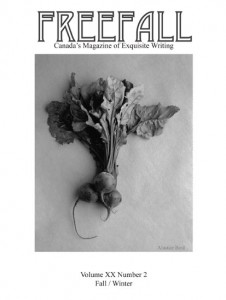 The Freefall 2010 Chapbook Contest Winners – Prose Winner: Flee the Rising Sun by Madelaine Wong and Poetry Winner: A Hundred Pelts by Juleta Severson-Baker – both now have their chapbooks available for purchase on the Freefall website.
The Freefall 2010 Chapbook Contest Winners – Prose Winner: Flee the Rising Sun by Madelaine Wong and Poetry Winner: A Hundred Pelts by Juleta Severson-Baker – both now have their chapbooks available for purchase on the Freefall website.
Spread the word!
Annalemma – 2010
This is the most beautiful literary journal I’ve read recently, possibly ever. From the text layout to the colored paper stocks behind the illustrations, each detail contributes to a visually striking book.
Spread the word!
Chinese Literature Today – Summer 2010
It is a privilege to review this premiere issue of a premier publication from the publishers of the time-honored and highly regarded World Literature Today at the University of Oklahoma. Chinese Literature Today is a gorgeous magazine – even the ads are spectacular – and an important one on multiple levels. Continue reading “Chinese Literature Today – Summer 2010”
Spread the word!
Crazyhorse – Spring 2010
One of the things I have always appreciated most about Crazyhorse is Crazyhorse’s appreciation of the capacity of language’s glorious limitations, the way in which what we cannot say, must say, do not say, and end up saying anyway comes to life in the hands of a gifted writer. Here is Jennifer Militello reassuring me that this issue won’t let me down in her poem, “A Dictionary at the Turn of the Millennium”: Continue reading “Crazyhorse – Spring 2010”
Spread the word!
Fourteen Hills – 2010
Fourteen Hills spans the spectrum of creative writing, producing an exciting and vivid cross-section of contemporary writing. Alison Doernberg’s rich and textured poem “(Save)” kicks off the issue, with “everything / suspended in ink, and everything that is not” an apt description of the content that follows. Continue reading “Fourteen Hills – 2010”
Spread the word!
The Meadow – 2010
The Meadow is an annual published at Truckee Meadows Community College in Reno, Nevada with an editorial staff of faculty, an awards program, and a predilection for personal story and narrative-driven writing. The work of two veteran and gifted writers, Adrian C. Louis and Mark Terrill, and accomplished photographer Dana Oldfather, is accompanied by much student writing, including poems, personal essays, and artwork. Continue reading “The Meadow – 2010”
Spread the word!
Minnetonka Review – Fall 2010
This issue features 7 short stories, four works of nonfiction, and poems by a dozen and a half poets. Best-known writers in the TOC are poets Philip Dacey, Simon Perchik, and Mary Crow. Art Director Keith Demanche contributes a number of captivating black and white photographs of Minnesota nature scenes. They capture with uncanny accuracy the grandeur and drama of the landscape with its massive skies and showy weather. Continue reading “Minnetonka Review – Fall 2010”
Spread the word!
Natural Bridge – 2010
Guest editor Nanora Sweet defines this issue’s special section on Writing/Politics/Status/Gender as “driven by gender in a political year…a body politic(s) knit tenuously together by that most gendered set of relationships, of family.” Her selection of family-themed poetry, fiction, and essays is largely of work I would describe as affable without being cloying, sometimes deceptively casual while possessing deeper implications, and eminently readable. Continue reading “Natural Bridge – 2010”
Spread the word!
Paterson Literary Review – 2010/2011
More than 360 pages of poetry and prose selected from the 10,000 submissions the journal receives annually. A “spotlight” on Diane de Prima, including a short bio, a number of poems and a story, is followed by poems from more than 70 poets, 8 prose selections, reviews, and this year’s Allen Ginsberg Poetry Award winners and honorable mentions (another 40+ poets). The issue’s highlights include the magazine’s beautiful cover, an original oil painting by Robert Andriulli, “Mill Town Neighborhood.” Continue reading “Paterson Literary Review – 2010/2011”
Spread the word!
Salt Hill – 2010
Is Bob Hicok stalking me? His name appears in the TOC of nearly every journal I’ve reviewed for so long now that I no longer remember what is was like to read a magazine without encountering a Hicok poem. Not that I’m complaining. Who would dare complain about an opening like this one to “Perhaps an entry somewhere in a book”: Continue reading “Salt Hill – 2010”
